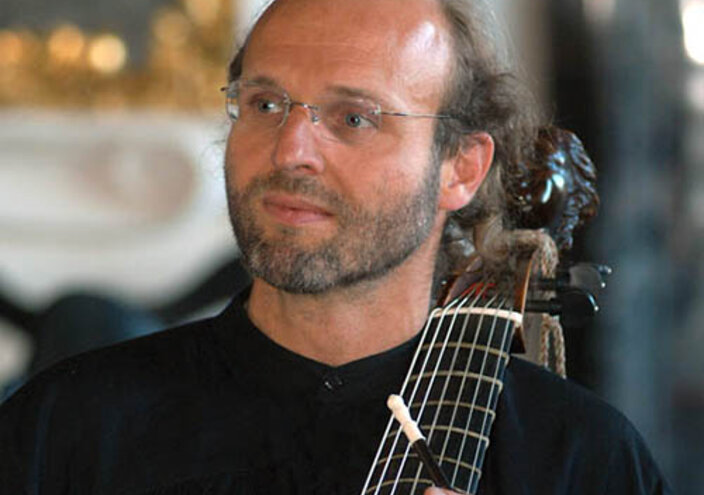
Contact details
Vita
Lorenz Duftschmid received his first musical education at the Bruckner Conservatory and at the Music High School in Linz, where he already founded his own early music ensembles "Ars Antiqua" and "Consortium Musicum". During this time he already had intensive musical contacts with August Wenzinger, Wieland Kuijken, Charles Medlam, Gustav Leonhard, Ferdinando Luigi Tagliavini, Erwin Ortner and Josef Mertin at master classes or in joint projects.
After graduating from the Music High School in Linz, Lorenz Duftschmid completed his studies in the viola da gamba class of Jordi Savall at the Schola Cantorum in Basel/Switzerland with the diploma examination with the grade "very good". This was followed by many years in which he travelled the world as a soloist with first-class ensembles and conductors. So Lorenz Duftschmid stood among others stood on stage with the following musicians: Ton Koopman, Jordi Savall, Montserrat Figueras, Claudio Abbado, Michael Giehlen, Rolf Lislevand, Andrew Lawrence- King, Fabio Biondi - L'Europa Galante, Rinaldo Alessandrini, Alfredo Bernardini - Zefiro, Michael Chance, Bob van Asperen, Christophe Coin, Derek Lee Ragin, Carlos Mena, Lee Santana, Andreas Staier, Andrea Marcon, Trevor Pinnock, Freiburg Baroque Orchestra, Vienna Symphony Orchestra, Berlin Philharmonic, Sir John Eliott Gardiner. More than 70 CD recordings document this.
Today Lorenz Duftschmid dedicates himself to his performances as soloist and conductor as well as to his own ensembles Armonico Tributo and AnLeuT and to teaching. Productions with scenic music, the artistic productions of great baroque festivals with more than 70 artists as well as approx. 60 performances per year at music festivals such as Madrid-Prado, Oslo Chambermusic, Lisbon-Gulbenkian, Festival van Flandern, Scala di Milano, Paris-Louvre, Berkley-Early Music Festival, LIVA, Versailles, City-Hall Hong Kong, Colon-Buenos Aires and the Bach Days-Nantes, the Wiener Konzerthaus and Musikverein, the International Bach Festival Leipzig and the styriarte show in an exemplary way the broad range of musical intention.
The series of own CDs, which have been enthusiastically received by international critics, began with solo works by Georg Philipp Telemann and Johannes Schenck as well as ensemble works by Johann Heinrich Schmelzer, Johann Joseph Fux, Heinrich Ignaz Franz Biber and Georg Muffat. In 2003 Lorenz Duftschmid began recording the complete French repertoire for viola da gamba at the suggestion of Deutschlandfunk. The solo albums Marin Marais - Piéces de Charactére, Francois Couperin - Pieces de Violes and Antoine Forqueray - Piéces de Viole are already available.
In addition, he cultivated artistic exchange - one of the maxims of the musician Lorenz Duftschmid - from 1989 to 2005 within the framework of his guest professorship for viola da gamba and historical performance practice at the University of Music and Performing Arts in Graz and, since 2003, at the State Academy of Music in Trossingen/Germany, as well as in his capacity as musical director of the International Chamber Music Days Raumberg (Musical Director, Master Course Viola da gamba and Performance Practice until 2000) and the International Early Music Week in Krieglach (musical direction, Master Course Viola da gamba and Performance Practice since 1989). At his master classes in La Seu d'Urgell (Spain, 1989 - 1998), Montepulciano (since 2005) and Michaelstein (Germany, since 2004), the didactically committed transfer of his playing technique of historical string instruments, which was specially developed according to old sources using the most modern technical standards, to talented young musicians is also a major concern of his.
Over the years, Lorenz Duftschmid has been able to make a name for himself in the field of Austrian early music from the Middle Ages to classical music on original instruments. The following focal points of his scientific / artistic work certainly contribute to this: numerous practical new editions of works by P. Peuerl, J.J. Fux, J.H. Schmelzer, H.I.F. Biber, G. Muffat, O.v. Wolkenstein, G. Rovetta; instruments from Austria in their original condition and in their original style of playing, intensive source research in the National Library Albertina / Vienna, monastery archives (e.g. Rein, Kremsmünster, Schlägl, Lambach, St. Lambrecht, St. Florian) and in private collections.
In 2001 Lorenz Duftschmid was awarded the Great Josef Krainer Prize of the Province of Styria for his cultural merits.
In 2003 Lorenz Duftschmid began recording the complete French repertoire for viola da gamba at the suggestion of Deutschlandfunk and he founded the Johann Joseph Fux Madrigalists. He took over the artistic direction of performances at the Carintischer Sommer in Ossiach (Dowland - Lachrymæ), at the cycle "Musica Antiqua" in the Musikverein Vienna, at the Leipzig Bach Festival (Muffat, Fux, Bach), at the styriarte Graz (Festival of Transience, the Bruckner Festival in Linz, and he conducted the scenic Monteverdi -
2003 begann Lorenz Duftschmid auf Anregung des Deutschlandfunks mit der Gesamteinspielung des französischen Repertoires für Viola da gamba und er gründete die Johann Joseph Fux – Madrigalisten. Er übernahm die künstlerische Leitung von Auftritten u.a. beim Carintischen Sommer in Ossiach (Dowland – Lachrymæ), beim Zyklus „Musica Antiqua“ im Musikverein Wien, beim Leipziger Bachfest (Muffat, Fux, Bach), bei der styriarte Graz (Fest der Vergänglichkeit, dem Brucknerfest in Linz, und er dirigierte die szenische Monteverdi – Production ballo.mortale (director - Philipp Harnoncourt) at the Vienna Chamber Opera. In spring 2004, Lorenz Duftschmid habilitated at the University of Arts in Graz as a university lecturer for viola da gamba and, together with Arrigo Wunschheim, founded his own sheet music edition and CD publishing company in the AnLeuT group.
Since 2004, Lorenz Duftschmid has regularly performed in the cycle "Musiqua Antiqua" of the Gesellschaft der Wiener Musikfreunde. In 2006, performances at the Schubertiade, in Riga and Moscow are on the programme, as well as the recording of Telemann's Paris Quartets and the first complete recording of August Kühnel's viola da gamba works.